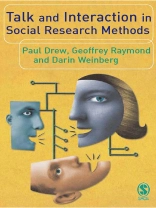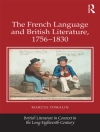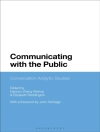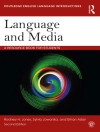′This book admirably fulfils its stated objective of describing social research methods in action and exploring, from a range of perspectives, the linguistic shaping of social context. Overall, this is a balanced, well-edited and coherent collection of papers, bringing together high quality work from recognized authorities in the analysis of talk-in-interaction. It is also highly accessible; it would certainly make an excellent resource book for undergraduate, graduate (and practising!) social scientists ′
– Rebecca Clift, University of Essex
′ Talk and Interaction in Social Research Methodologies is a much-needed methods text. Focusing on research methods in action, the volume offers a new way of viewing the realities of social research. By taking language use seriously, the text reveals the details and depths of a wide range of research projects as they have seldom been presented before.
This is the first book of its kind to offer such a powerful and insightful depiction of the role of talk-in-interaction in relation to social research methods. The book′s plan is creative and unparalleled. There′s nothing else like it.
The editors—Paul Drew, Geoffrey Raymond and Darin Weinberg—represent the very best from multiple traditions of researching talk-in-interaction—from both sides of the Atlantic. The chapters are written by a sterling collection of researchers—a virtual honor roll of conversation analysts and kindred spirits.
This book is a ‘must read’ for social researchers of all disciplines who are interested in social interaction. It should be assigned reading for all graduate students being introduced to qualitative methods. It should be on every qualitative researcher′s book shelf. It is a tour de force in demonstrating the absolutely fundamental position that language use holds in social science methodology′ – James A Holstein, Marquette University
This is a methodology text with a difference. It demonstrates the importance of talk in a variety of social research methodologies. Even documents, the seemingly least interactional form of social data, are shown to have important interactional dimensions. The book focuses systematically on how sociological methods are essentially conducted through forms of spoken interaction, and how these interactions shape the results that emerge in research. The book demonstrates:
‘ How spoken interactions shape the outcomes of core research methodologies
‘ The role which talk-in-interaction plays in key substantive areas of sociology notably race, crime, gender and media
‘ Reveals the interactional underpinnings of research methodologies
This is the first text aimed at an undergraduate and Master′s audience in Sociology and Social Research, which shows the crucial part that spoken interaction plays in the conduct and products of conventional sociological methodologies.
Tabella dei contenuti
The Language of Social Science – Darin Weinberg
A Brief Introduction
PART ONE: TALK-IN-INTERACTION IN THE CONTEXT OF RESEARCH METHODOLOGIES
Standardization-In-Interaction – Douglas W Maynard and Nora Cate Schaeffer
The Survey Interview
Interaction in Interviews – Robin Wooffitt and Sue Widdicombe
Analyzing Interaction in Focus Groups – Sue Wilkinson
When Documents `Speak′ – Paul Drew
Documents, Language and Interaction
Observation, Video and Ethnography – Anssi Peräkylä
Case Studies in AIDS Counselling and Greetings
Language, Dialogue and Ethnographic Objectivity – Darin Weinberg
PART TWO: TALK-IN-INTERACTION IN THE CONTEXT OF RESEARCH IN FIELDS OF SUBSTANTIVE SOCIOLOGICAL RESEARCH
Questions at Work – Geoffrey Raymond
Yes/No Type Interrogatives in Institutional Contexts
Understanding News Media – Steven E Clayman
The Relevance of Interaction
Talking Sex and Gender – Celia Kitzinger
Anomalies and Ambiguities – Byron Burkhalter
Finding and Discounting the Relevance of Race in Interracial Relationships
Using Talk to Study the Policing of Gangs and Its Recordwork – Albert J Meehan
Circa l’autore
Darin Weinberg is a university reader in the Department of Sociology, Cambridge University and a fellow of King’s College, Cambridge. In addition to his interest in social constructionism, his research focuses primarily on the practical purposes to which concepts of addiction, mental disorder, and learning disability are applied in various historical and contemporary contexts. He is particularly interested in how these concepts figure in state-sponsored campaigns of social welfare and social control and in what their uses reveal about how and why people distinguish the social and natural forces held to govern human behaviour. His books include Contemporary Social Constructionism: Key Themes (2014); Of Others Inside: Insanity, Addiction, and Belonging in America (2005); Intoxication and Society (edited with Jonathan Herring, Ciaran Regan, and Phil Withington, 2013); Talk and Interaction in Social Research Methods (edited with Paul Drew and Geoffrey Raymond, 2006); and Qualitative Research Methods (edited, 2002).












